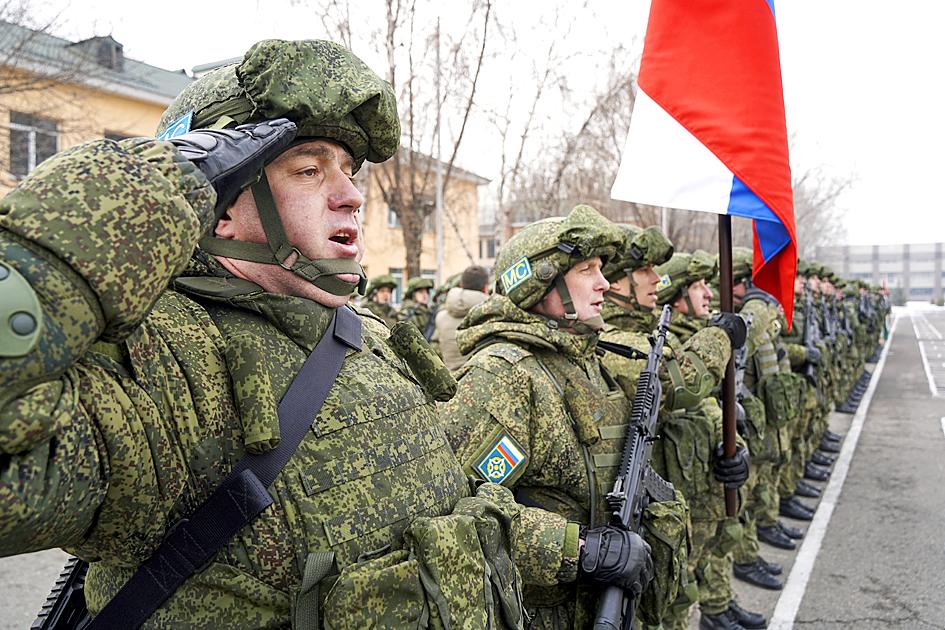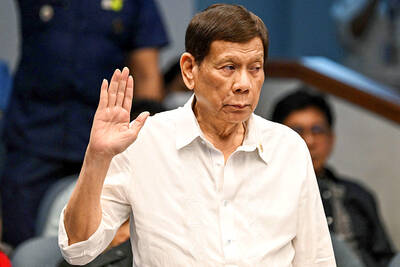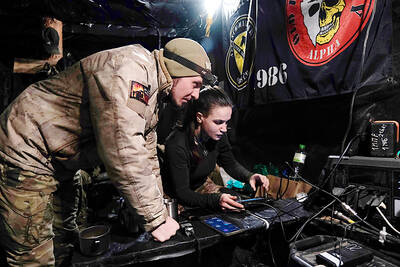More than 2,000 Russia-led troops yesterday began withdrawing from Kazakhstan after being deployed when peaceful protests over an energy price hike turned into unprecedented violence claiming dozens of lives.
The decision to dispatch peacekeepers was a first for the Moscow-led Collective Security Treaty Organization (CSTO), often touted by Russia as a NATO equivalent, but previously reluctant to interfere in unrest in central Asia — a region with long historical ties to Russia.
At a ceremony marking the end of the CSTO mission, soldiers lined up as anthems from each of the six CSTO member countries were played before official speeches began.

Photo: AP
“The peacekeeping operation is over ... the tasks have been fulfilled,” said Russian General Andrei Serdyukov, commander of the CSTO contingent that saw troops from Russia, Belarus, Armenia, Tajikistan and Kyrgyzstan sent to the former Soviet republic on Jan. 6.
The “collective peacekeeping forces ... are starting to prepare equipment and materiel for loading into the planes of the military transport aviation of the Russian aerospace forces and returning to the points of permanent deployment,” the Russian Ministry of Defense said.
Kazakh President Kassym-Jomart Tokayev on Wednesday said that Russian and allied forces “played a very important role in terms of stabilizing the situation in the country” during his first visit to the country’s main city, Almaty.
The financial hub of 1.8 million people was devastated during clashes between security forces and government opponents that gave way to a spree of looting.
“Without a doubt, it was of great psychological importance in repelling the aggression of terrorists and bandits. The mission can be considered very successful,” Tokayev added.
One of the strategic buildings that the CSTO contingent was guarding was Almaty airport, which was reportedly seized by government opponents last week.
The airport’s press service said that it was handling both domestic and international flights again yesterday.
Agence France-Presse correspondents earlier yesterday witnessed a funeral for a serviceman killed during the clashes which was attended by dozens of soldiers and featured somber military music. Tokayev has framed the clashes as a coup attempt assisted by local and international terrorists.
Russian counterpart Vladimir Putin hinted that the violence was reminiscent of “color revolutions” instigated by foreign meddling.
Those narratives resonated with some residents of Almaty, despite the lack of proof provided by authorities.
Retired engineer Malik Shai-mukhambetov blamed the shoot-outs in his city on “foreign aggression,” which he said had subverted state troops and allowed gangs to seize government buildings.
“I see these events as a kind of orange revolution provoked by the west,” Shaimukhambetov said, referring to political protests that erupted in Ukraine in 2004.
Tokayev said the phased withdrawal of the foreign troops would take no more than 10 days.

FEROCIOUS FISH-EATER Scientists have found a new species of dinosaur from the Cretaceous Period, a ‘hell heron’ that stalked the rivers, deep in the Saharan desert At a remote Sahara desert site in Niger, scientists have unearthed fossils of a new species of Spinosaurus, among the biggest of the meat-eating dinosaurs, notable for its large blade-shaped head crest and jaws bearing interlocking teeth for snaring fish. It prowled a forested inland environment and strode into rivers to catch sizable fish like a modern-day wading bird — a “hell heron,” as one of the researchers put it, considering it was about 12 meters long and weighed 5-7 tons. The dinosaur presented a striking profile on the Cretaceous Period landscape of Africa some 95 million years ago as it hunted

THE TRAGEDY OF PUNCH: Footage of the seven-month-old Japanese macaque has gone viral online after he was rejected by his mother and formed a bond with a soft toy A baby monkey in Japan has captured hearts around the world after videos of him being bullied by other monkeys and rejected by his mother went viral last week. Punch, a Japanese macaque, was born in July last year at Ichikawa City Zoo. He has drawn international attention after zookeepers gave him a stuffed orangutan toy after he was abandoned by his mother. Without maternal guidance to help him integrate, Punch has turned to the toy for comfort. He has been filmed multiple times being dragged and chased by older Japanese macaques inside the enclosure. Early clips showed him wandering alone with

DRUG WAR: The former president said there was no campaign to kill addicts, but his speeches called for violence and told police to use lethal force if necessary Former Philippine president Rodrigo Duterte earned global infamy for the deadly drug crackdown that led to his arrest over crimes against humanity charges, despite his huge popularity at home. A profane-lipped populist and self-professed killer, Duterte’s anti-crime campaign resulted in the deaths of thousands of alleged dealers and addicts. Rights groups said many of those killed were poor men, often without any proof they were linked to drugs. Yet, while drawing condemnation abroad, tens of millions of Filipinos backed his swift brand of justice — even as he joked about rape in his rambling speeches, locked up his critics and failed to

GAME CHANGER The Russian invasion of Ukraine has shown the utility of small drones for recon, for supporting logistics and for killing across the modern battlefield Five European nations have announced a new program to produce low-cost air defense systems and autonomous drones using Ukrainian expertise, hard-won over the past four years fighting against Russia. Friday’s initiative of the five nations — France, Poland, Germany, the UK and Italy — comes as one of many European efforts to bolster defense along their borders, like a “drone wall ” with Russia and Ukraine to better detect, track and intercept drones violating Europe’s airspace. Both Moscow and Kyiv have cutting-edge drone warfare capabilities forged in the grim laboratory of war where battlefield innovations have rewritten modern battle tactics. Poland is